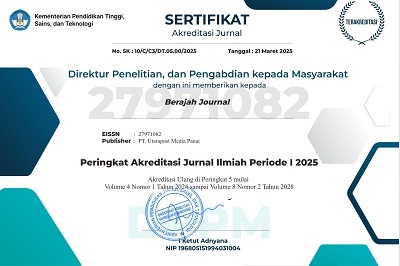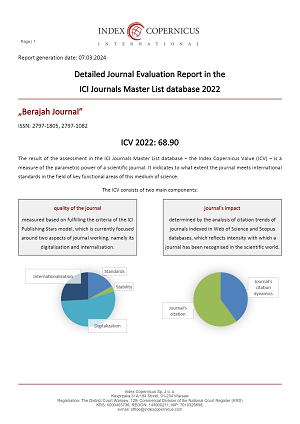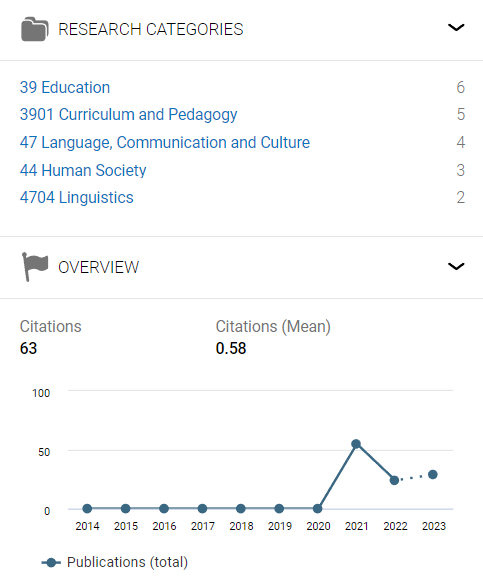DEVELOPMENT OF DISTANCE LEARNING TECHNOLOGY WITH SMART CAMPUS IN IMO CONVENTION SUBJECT IN THE COVID-19 PANDEMIC AT MALAHAYATI MERCHANT MARINE POLYTECHNIC
DOI:
https://doi.org/10.47353/bj.v2i4.170Keywords:
Smart Campus, Distance Learning, Covid-19, Malahayati Merchant Marine PolytechnicAbstract
Pandemic Covid-19 in 2022 will continue and of course bring changes to the habits of human life in the world, especially in Indonesia, these changes bring new habits to human activities that make them study, work and worship from home, this certainly brings changes to the learning system that implemented in every educational institution that brings changes to the learning system, namely the Distance System. In 2021 the Malahayati Merchant Marine Polytechnic will develop a new distance learning technology called the Smart Campus. The development can provide convenience for various parties, namely students, educators, and education staff responsible for the implementation of the distance learning system at the Malahayati Merchant Marine Polytechnic. The purpose of this study was to examine in terms of the effectiveness of using a smart campus as a technology in the implementation of distance learning, it certainly wanted to observe the relation to the learning achievement of students and the activeness of lecturers in implementing distance learning using a smart campus. This research method uses This study uses a descriptive qualitative approach. The data collection methods that will be used in the study are interviews, questionnaires, observation, and documentation. To test the hypothesis, a multiple regression measuring instrument (multiple regression) will be used where the amount of Y (learning achievement) quantitatively will be known from each variable X. The results of this study show that based on the results of the study, the calculated > Ftable > 2,311] at the significance level 50,725 = 5%, it states that simultaneously (together) the smart campus application variable affects the learning achievement of participants studied at the Malahayati Merchant Marine Polytechnic.
Downloads
References
Deshwal, P., Trivedi, A., & Himanshi, HLN (2017). Online learning experience scale validation and its impact on learners' satisfaction. Procedia computer science, 112, 2455-2462. DOI: https://doi.org/10.1016/j.procs.2017.08.178
Isaac, O., Aldholay, A., Abdullah, Z., & Ramayah, T. (2019). Online learning usage within Yemeni higher education: The role of compatibility and task-technology fit as mediating variables in the IS success model. Computers & Education, 136, 113–129. DOI: https://doi.org/10.1016/j.compedu.2019.02.012
Karwati, E. (2014). Pengaruh Pembelajaran elektronik (e-learning) terhadap mutu belajar mahasiswa. Jurnal Penelitian Komunikasi, 17(1), 41–54.
Navimipour, NJ, & Zareie, B. (2015). A model for assessing the impact of e-learning systems on employees' satisfaction. Computers in Human Behavior, 53, 475-485. DOI: https://doi.org/10.1016/j.chb.2015.07.026
Nugroho, MA, Setyorini, D., & Novitasari, BT (2019). The role of satisfaction on perceived value and e-learning usage continuity relationship. Procedia Computer Science, 161, 82–89. DOI: https://doi.org/10.1016/j.procs.2019.11.102
Pereira, FA de M., Ramos, ASM, Gouvêa, MA, & da Costa, MF (2015). Satisfaction and continuous use intention of e-learning service in Brazilian public organizations. Computers in Human Behavior, 46, 139–148. DOI: https://doi.org/10.1016/j.chb.2015.01.016
Rienties, B., & Toetenel, L. (2016). The impact of learning design on student behavior, satisfaction and performance: A cross-institutional comparison across 151 modules. Computers in Human Behavior, 60, 333–341. DOI: https://doi.org/10.1016/j.chb.2016.02.074
Tîrziu, AM, & Vrabie, C. (2015). Education 2.0: E-learning methods. Procedia-Social and Behavioral Sciences, 186, 376-380. DOI: https://doi.org/10.1016/j.sbspro.2015.04.213
Wang, C., Hsu, H.-CK, Bonem, EM, Moss, JD, Yu, S., Nelson, DB, & Levesque-Bristol, C. (2019). Need satisfaction and need dissatisfaction: A comparative study of online and face-to-face learning contexts. Computers in Human Behavior, 95, 114–125. DOI: https://doi.org/10.1016/j.chb.2019.01.034
Yilmaz, R. (2017). Exploring the role of e-learning readiness on student satisfaction and motivation in a flipped classroom. Computers in Human Behavior, 70, 251–260. DOI: https://doi.org/10.1016/j.chb.2016.12.085
Downloads
Published
How to Cite
Issue
Section
License
Copyright (c) 2022 Rispa Saeful Mu'tamar, Fazri Hermanto

This work is licensed under a Creative Commons Attribution 4.0 International License.




























